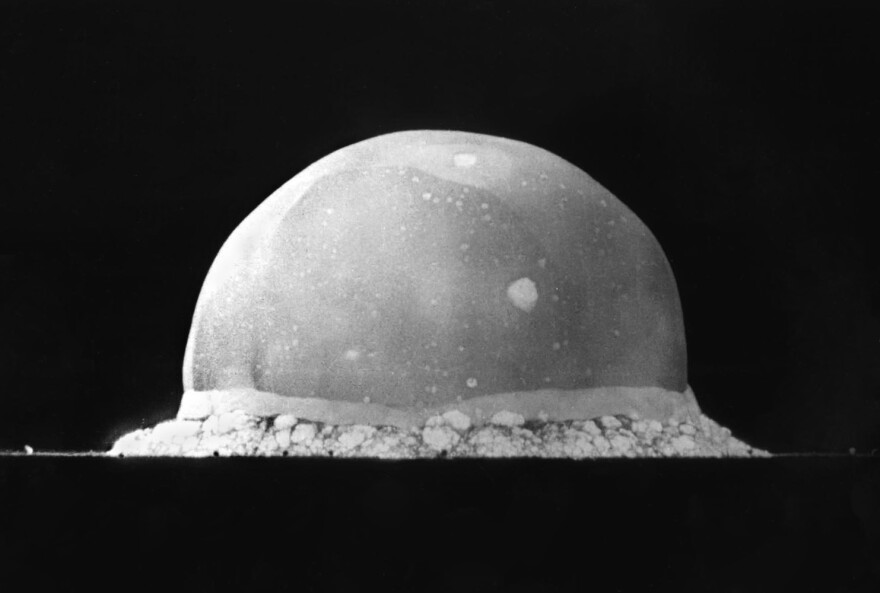That beautiful light was caused by a very ugly explosion 10,000 times hotter than the surface of the sun. So hot in fact that every living creature within a one-mile radius of ground-zero was annihilated and the desert sand was instantly transformed into jade-colored glass.
Rising above the destruction was a towering and ominous 40,000-foot mushroom cloud. America had successfully detonated the first atomic bomb and created a weapon of mass destruction. Whatever future could have been imagined for the human race up until that moment now included destroying the world.
It seems as though technology has been a sort of Faustian Bargain for our species: it giveth and it taketh away.
With the birth of the Atomic Age, we generated three possible scenarios for the future of our species, beginning with the most obvious: extinction. In this scenario, we destroy ourselves and go extinct just like the billions of species that have gone extinct before us. I hope I’m wrong, but presently this extinction scenario appears to be the most likely.
Scenario 2: We build a utopia. We stop fighting and start working together. We solve problems rather than create them. We use our technology for good, not evil. We start saving the planet rather than destroying it and our species survives and thrives into the deep future.
And by “deep future” I mean millions of years.
In this scenario, our species could exist for so long that our descendants are still here when our sun finally runs out of the hydrogen it’s burning in its reactive core and swells to a red giant. When that happens all of the oceans will boil causing a runaway greenhouse effect. Earth’s surface temperature will rise to 750 degrees Fahrenheit and then quickly double as the planet becomes engulfed in a global forest fire that will burn until all of the oxygen in the atmosphere is gone.
All life on Earth will perish in the crucible of the expanding sun. We know this is the fate of our sun because we’ve observed other stars in our own galaxy dying this way.
This cycle of life and death of stars has been going on for a very long time. And thankfully so. The essential elements for all organic life—carbon, oxygen, hydrogen, nitrogen—these have all been forged in the death of stars. You and I are, as cosmologist Carl Sagan famously put it: “made of star stuff”.
Scenario 3: We leave Earth and head out to a cooler and more inhabitable corner of the galaxy. By “we”, I don’t mean humans like you and me. Our descendants will need to be radically different from us in order to survive deep space travel and rapid adaptation to the harsh environment of the cosmos.
The only way that we might accomplish this is through the continued advancement of technology in fields such as genetic engineering, nanotechnology, artificial intelligence, and robotics; all of which could enable our descendants to live much longer than you and I. Perhaps forever.
How might we do this?
We’ll do it by editing our DNA to become impervious to disease and to rapidly adapt to new environments. We’ll manufacture replacement organs and perhaps entire bodies. We’ll connect our limited brains directly to powerful AI systems to augment our intelligence. We’ll merge and modify our fragile organic bodies with hardier robotic parts.
This sounds like sci-fi, but these things are already happening today to one degree or another and will continue to accelerate and improve exponentially.
Surviving into the deep future sounds a bit far-fetched too, especially when you consider that Homo sapiens have only been around for 200,000 years.
Life first appeared on Earth 3.8 billion years ago. We’ve only been here for .00001 percent of that time. And yet, we have achieved so much in such a short time because of technology.
Technology is what makes us human; it’s why we have survived and thrived as a species. Without technology, we would have perished long ago. And without further development of technology, our descendants will not have a chance to survive into the deep future.
We have the opportunity and capability to radically and rapidly change our destiny through the further creation and application of technology. But, if mishandled or misguided those very same technologies will be what drive us to extinction.
It seems as though technology has been a sort of Faustian Bargain for our species: it giveth and it taketh away.
But unlike the fictional character of Faust in the story who makes a deal with the Devil, exchanging his soul for unlimited knowledge and power, the only pact we’ve made is with ourselves and we don’t have to sacrifice our morality in order to achieve unlimited knowledge, power, and immortality for our descendants.
Further development of technology that is informed and structured by our morality may very well be the key to success. Our humanity might be the most important technology we have ever created.
We live in the best of times and the worst of times. It’s the best of times because of all the amazing technologies we’ve developed and benefit from, but it’s the worst of times because the stakes have become so high and the margin for error so low.
I hope we choose to make our present time an age of wisdom and not foolishness, that we endeavour to use our technology wisely to create a world in which our descendants might inherit not only the Earth but the cosmos too because they’re going to need it.
This is a condensed version of Scott Dewing's 2019 TEDxAshland Talk.





